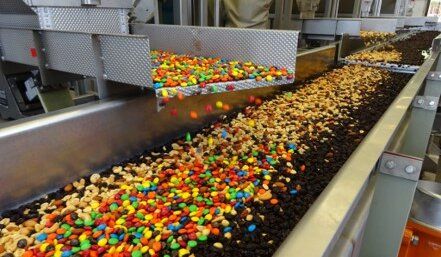
Blog
10 Factors That Affect the Price of a Sanitary Conveyor System
Your sanitary conveyor system is far more than add-on equipment that moves products between processes. It’s a long-term investment to maximize productivity and minimize downtime — while always delivering a safe, appealing product to your customer.
If you’re a plant manager or engineering project lead looking to level up your conveyance game, you already know there are plenty of generic solutions, off-the-shelf products, and price-first providers waiting to fill the gap in your line.
Here, we explore some of the factors that go into the price of a sanitary conveyor system and why it makes sense to pay more upfront for future-ready equipment that will continue to reduce costs and add value down the line.
BOTTOM LINE: SANITARY CONVEYOR SYSTEM PRICE FACTORS
As an established food manufacturer, you’ve already heavily invested in big-ticket OEM processing units. While it can be tempting to economize when it comes to handling equipment, cutting corners on conveyor systems can cost you more later in maintenance, downtime, retrofits, and even product recalls.
These 10 factors help determine the up-front cost you’ll see on a premium sanitary conveyor system.
- Equipment Type
- Components & Integrations
- Footprint
- Sanitation
- Controls
- Customizations
- Design Quality
- Parts
- Maintenance
- Customer Support
Let’s take a closer look at each of these factors and consider how smart choices today can help return long-term value and performance in the future.
1. Equipment Type
Many operations can be performed by different types of machines, but choosing the right system for your application can have big implications for efficiency, reliability, and food safety.
![]()
From horizontal and incline belt conveyors to bucket elevators and flexible vibratory conveyors, PFI works with your engineers to determine the right equipment solution based on your:
- Application
- Food type
- Throughput
- Budget
2. Components & Integrations
System prices scale from just a few thousand dollars for an individual conveyor to hundreds of thousands for a fully integrated system. A specialist equipment provider will look at the total number of individual conveyors you will need, along with supporting equipment including platforms, stairs, elevators, and parts carts.
Various integrations add to the complexity and number of machines needed. This may include equipment that transfers products to move smoothly from a wide machine to a narrower one or merges and separates multiple lines.
Expert equipment providers will price in fully-engineered integrations to allow products to move seamlessly through your system. It also helps to partner with a provider who not only fabricates but installs their equipment, to ensure consistent work quality and seamless integration.
3. Footprint
The number of conveyor units you will require, and the width and reach of individual units depends on several factors, including:
- Your processing volume
- The size and configuration of your facility
- The specs of your existing processing equipment
For example, most conveyor equipment can be either floor or ceiling mounted and delivered in a variety of widths to meet your production needs with only a marginal price change relative to the overall project cost.
And depending on the equipment type, the same footprint may require two or more units working in a series for the best performance. For example, the maximum length of a vibratory conveyor is approximately 20 feet for optimal vibration, while a belt conveyor can extend to over 100.
4. Sanitation
Cost-effective food conveyor installations match the sanitary design to the specific needs of your product and process. While safety always comes first, the hygiene requirements of, for example, packaging wrapped candy or dry pasta are very different from those needed when handling meats or uncooked products.
There is no substitute for experience when it comes to building conveyors that deliver value while meeting and exceeding the hygiene requirements of your industry. All food-handling equipment should feature basic sanitary design features including:
- Stainless steel construction in the food zone at a minimum
- Angled surfaces to shed liquids
- A simple modular design to ensure easy, effective cleaning
More demanding applications, such as raw proteins and fresh produce handling, require more specialized equipment that meets or exceeds specific USDA, GMA, and BEMA standards, among others.
This equipment must meet the highest design and fabrication standards, including smooth, easy-swab surfaces that minimize bacteria-harboring opportunities and minimal seals, joints, or contact points. For these applications, leading brand food-grade vibratory or horizontal motion conveyors deliver the highest standard of hygiene, including:
- Easy wipedown pans
- IP69K-certified parts capable of withstanding repeated high-temperature washdowns
- Toolless maintenance and parts replacement to minimize surface or component damage
- Direct-drive beltless movement
![]()
It’s also important to bear in mind that sanitation standards are constantly improving and equipment that only meets current regulations could quickly become sub-standard.
Choose a provider who not only meets but exceeds the latest standards, including the FSMA regulations currently being rolled out by the FDA, to ensure a future-proof investment in conveyor technology.
5. Controls
![]()
Integrated, centralized electrical controls allow one operator to start and stop multiple machines quickly and easily. This improves worker safety and boosts efficiency by allowing less downtime during system-wide stop-starts. Fully integrated control systems cost more but offer real gains in system performance.
6. Customizations
As an industry-leading conveyor manufacturer, PFI is best positioned to make modifications to our equipment, including:
- Floor, ceiling, or mezzanine installations
- Custom infeed and discharge modifications
- Specialized sanitation requirements
- Process-specific options, including clean-in-place systems, gates, belt scrapers, topping applicators, etc.
We provide a full range of system support items for our conveyors, including platforms and catwalks, as well as safety equipment such as emergency stops, cut-offs, and failsafes.
Our systems can also be fully integrated with other common food-processing functions including vision, metal-detecting, and X-Ray equipment.
7. Design Quality
Superior industrial design is one of the key differentiators that set high-quality sanitary conveyors apart from more generic equipment. Quality design shapes every aspect of a conveyor, including:
- Engineering: How well a unit integrates with your line
- Operation: How well machinery runs over the long term
- Maintenance: How easy equipment is to clean and maintain
- Safety: How easily surfaces can be cleaned and test-swabbed
- Quality: How well the conveyor handles your product, including minimizing damage and waste and preserving its physical appeal
At PFI, we use our decades of experience and industry expertise to build safe, reliable conveyors designed for long-term return on investment. While many of our competitors may measure equipment life in years, we measure ours in decades.
8. Parts
Parts maintenance and replacement are key components of the lifetime cost of conveyor machinery. Quality conveying equipment is more likely to include:
- A minimum number of moving parts
- Open and accessible design for easy maintenance
- Features designed to avoid or minimize maintenance issues
Choosing a high-quality design with less moving and consumable parts is more expensive up-front, but fewer parts replacements and less machine wear over time mean a longer-term return on investment.
9. Maintenance
Maintenance does contribute to the long-term cost of equipment. Equipment built with higher-quality design and materials reduces downtime and makes maintenance quicker when it does need to be done. Some leading brand conveyors also feature toolless parts replacement to minimize the chance of damage to food-exposed surfaces.
Regular replacement of wear parts, including belts, vibratory springs, and dumper cylinders, is necessary on all conveyor systems. Choosing a quality system at the outset and making sure scheduled maintenance and inspections take place on time protects your investment and helps ensure your equipment will last for years or even decades.
10. Customer Support
Smart plant managers understand that a sanitary conveyor system is more than an equipment solution — ideally, it’s a relationship that starts at the design stage and continues as long as the equipment is installed in your facility.
These days it’s possible to get an off-the-shelf solution for almost anything you need, but quick-fix generic solutions can turn short-term gains into long-term pain as you struggle to keep inadequate equipment in service.
Choosing a reputable supplier with an established track record may add up-front cost to your project, but you gain the benefit of specialist knowledge and broad experience, as well as a long-term partner who stands by their products.That can mean:
- Front-end testing of your product and solutions
- Better integrations
- Expert installation of the conveying equipment and others
- Long-term maintenance support and parts ordering, and
- The ability to grow with you as your needs change.
![]()
It’s hard to put a number on the value of great customer service — except when you don’t have it. If you’re serious about safe, effective bulk food processing, choose an equipment provider with the staying power to stick with you for the long haul.
CONVEYING VALUE: WHY IT PAYS TO CHOOSE PFI
At PFI, we build and deliver customized sanitary conveying systems that offer outstanding performance, durability, and long-term returns for our customers. An investment in PFI conveying equipment adds quality and safety to your product today and value to your operations for decades to come. Here’s why:
- Sanitary systems: PFI is a world leader in sanitary systems that meet and exceed today’s strictest industry hygiene standards.
- Trusted technology: Leading meat, bakery, and RTE food brands trust PFI conveyors on their lines. We are the trusted leader in safe, reliable food conveyor technology.
- Expert team: PFI delivers equipment that meets the specific needs of your process and product. Nobody has more experience building conveyor systems for food processing.
- Custom-configured solutions: At PFI, we tailor-make every system to your exact specs. We can even test your entire system with full FATs at our Algona, Iowa location.
- After-sales support: PFI stands by our products. We offer a full range of technical support, parts replacement, and preventative maintenance services.
Click below to learn more about our industry-leading conveyor solutions.
Quicklinks
© 2024 PFI. ALL RIGHTS RESERVED. | Privacy Policy | Terms and Conditions




